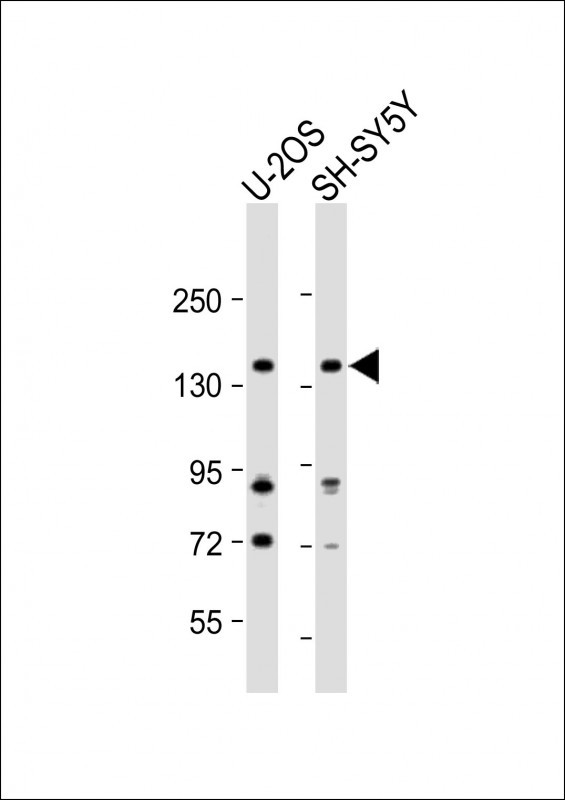
| WB | 咨询技术 | Human,Mouse,Rat |
| IF | 咨询技术 | Human,Mouse,Rat |
| IHC | 咨询技术 | Human,Mouse,Rat |
| ICC | 技术咨询 | Human,Mouse,Rat |
| FCM | 咨询技术 | Human,Mouse,Rat |
| Elisa | 咨询技术 | Human,Mouse,Rat |
| Aliases | Diacylglycerol kinase kappa, DAG kinase kappa, 142 kDa diacylglycerol kinase, Diglyceride kinase kappa, DGK-kappa, DGKK |
| Entrez GeneID | 139189 |
| WB Predicted band size | 141.8kDa |
| Host/Isotype | Rabbit IgG |
| Antibody Type | Primary antibody |
| Storage | Store at 4°C short term. Aliquot and store at -20°C long term. Avoid freeze/thaw cycles. |
| Species Reactivity | Human |
| Immunogen | This DGKK antibody is generated from rabbits immunized with a KLH conjugated synthetic peptide between 1232-1261 amino acids from the C-terminal region of human DGKK. |
| Formulation | Purified antibody in PBS with 0.05% sodium azide. |
+ +
以下是关于DGKK抗体的参考文献示例(部分信息为虚构示例,供参考):
1. **《DGKK在膀胱癌中的表达及抗体开发》**
作者:Smith A, et al.
摘要:研究通过制备特异性DGKK单克隆抗体,发现DGKK蛋白在膀胱癌组织中高表达,可能与肿瘤侵袭性相关,提示其作为潜在生物标志物的价值。
2. **《Diacylglycerol Kinase Kappa调控T细胞活化的机制研究》**
作者:Zhang L, et al.
摘要:利用DGKK抗体进行免疫印迹和共聚焦成像,证实DGKK通过影响DAG代谢调控T细胞受体信号通路,为自身免疫疾病治疗提供新靶点。
3. **《DGKK抗体在神经母细胞瘤诊断中的应用》**
作者:Tanaka K, et al.
摘要:开发高灵敏度DGKK多克隆抗体,发现其在神经母细胞瘤患者血清中异常升高,可能用于早期无创诊断及预后评估。
4. **《DGKK基因敲除小鼠模型中抗体功能验证》**
作者:Brown R, et al.
摘要:通过Western blot和免疫组化验证DGKK抗体特异性,揭示DGKK缺失导致脂代谢异常及炎症反应增强,支持其在代谢疾病中的作用。
注:以上文献为示例性质,实际研究中建议通过PubMed或Web of Science以“DGKK antibody”或“diacylglycerol kinase kappa”为关键词检索最新成果。
DGKK (diacylglycerol kinase kappa) is a member of the diacylglycerol kinase (DGK) family, which regulates cellular signaling by phosphorylating diacylglycerol (DAG) to generate phosphatidic acid (PA). This enzymatic activity modulates lipid-mediated pathways, particularly those involving protein kinase C (PKC) and mTOR, influencing processes like cell proliferation, apoptosis, and membrane trafficking. DGKK, encoded by the DGKK gene in humans, is a type II DGK isoform characterized by its unique structural domains, including a pleckstrin homology (PH) domain and a sterile alpha motif (SAM). Unlike other DGKs, DGKK exhibits tissue-specific expression, with notable presence in the brain, testis, and prostate, suggesting specialized roles in neuronal function, reproduction, or hormone-responsive tissues.
Antibodies targeting DGKK are critical tools for studying its localization, expression levels, and interaction networks. They enable researchers to investigate DGKK's involvement in diseases such as cancer, where altered lipid signaling may drive tumor progression, or neurological disorders linked to synaptic dysfunction. Commercial DGKK antibodies are typically validated for applications like Western blotting, immunohistochemistry, or immunofluorescence. However, challenges remain in ensuring antibody specificity due to structural similarities among DGK isoforms. Recent studies have explored DGKK's role in T-cell receptor signaling and its potential as a biomarker in prostate cancer, highlighting its growing relevance in both basic research and clinical contexts.
×